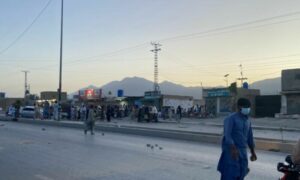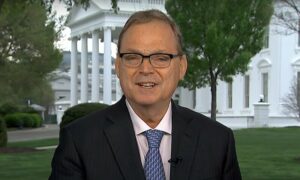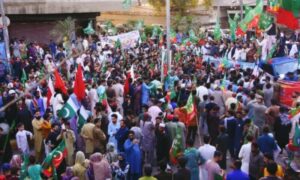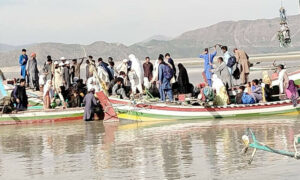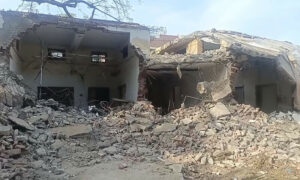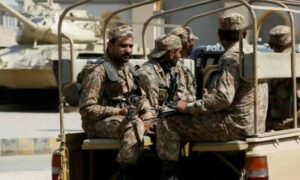‘There is no use of running on the wrong road’ — Turkish proverb
ELITE misrule in Pakistan has scarred the nation and left a legacy of socioeconomic underdevelopment and political disenfranchisement. Beyond the enclaves of affluence and prosperity in a handful of gated urban communities, the overwhelming majority of citizens live grinding, harsh lives of misery.
Without basic public services or economic opportunity, sans rule of law, recourse to independent courts, executive accountability and absent political voice, generations of Pakistanis have essentially led progressively hard lives in a progressively soft state. The past few years have unleashed an even harsher reality of state repression, stolen election mandates, and widespread miscarriage of justice. Instead of introspection, and an acknowledgement of a collective failure of governance, the ruling elite have now decided that the state needs to be even ‘harder’ in its approach to its disaffected citizens.
Consider the poisoned fruits of our collective mis-governance. In terms of human development, Pakistan has sunk to 164 out of 193 countries. More than its ranking, the true measure of its arrested development comes from its peer group in the Human Development Index. The three countries Pakistan, with a per capita income of $1,669, is just better than in the HDI are Lesotho ($878), Tanzania ($1,211), and Cote d’Ivoire ($2,729), with their respective per capita incomes in parentheses.
The three countries that are ranked just above Pakistan are Rwanda ($1,000), Togo ($1,013) and Mauritania ($2,149). In other words, in terms of human development, Pakistan is languishing among the cohort of some of the poorest sub-Saharan African countries.
Pakistan’s citizens have been leading hard lives for decades. They deserve a change.
It doesn’t end here. Assuming we are not fully entertained yet, here are some more sorry statistics.
The average life expectancy of a Pakistani, a basic measure of well-being, is the lowest in South Asia, just above Afghanistan. According to the World Bank, “Pakistan faces a silent, deep human capital crisis” with the country’s human capital outcomes “comparable to those in Sub-Saharan Africa”.
It has the highest number of out-of-school children in the world (over 20 million), the highest rate of stunting for children under five years (40 per cent), and the highest ‘learning poverty’ rate in South Asia as well as the entire cohort of lower middle-income countries. The latter means, according to the World Bank, that 79pc of Pakistani children are unable to read and understand a simple text by age 10.
Only 39pc of the population has access to safe drinking water, with ‘alarmingly high’ levels of arsenic in much of the country’s groundwater. Pollution levels are among the highest in the world, and up to 24pc of the analysed population in parts of Balochistan, Sindh, and KP were facing high levels of acute food insecurity when surveyed, according to The Integrated Food Security Phase Classification.
Within South Asia, Pakistan has the lowest exports to GDP ratio, the slowest structural as well as demographic transformation, the lowest savings and investments rates, and the lowest productivity growth. It is the longest user of IMF resources, has had recourse to the largest number of IMF programmes, and is the fourth largest borrower from the Fund in terms of absolute amount.
In the World Bank’s Worldwide Governance Indicators, Pakistan’s percentile rank for control of corruption is 23rd (ie, it is worse off than 77pc of the countries in the world); for rule of law, 25th; for government effectiveness, 29th; and for voice and accountability, 25th.
In short, this is the dystopian Pakistan its extractive, self-absorbed and insouciant elite have constructed. And after having brought us here, they now have pretensions of being able to fix it. In other words, the civilian and non-civilian elites that have shepherded Pakistan to this sorry state over the past decades, the very source of our malady, want to be our healing physicians.
While the recent Nobel Prize in Economic Sciences has focused attention on the framework presented by Acemoglu and Robinson, American economist Mancur Olson presented insights on elite malfeasance two decades earlier.
In his 1993 paper, Dictatorship, Democracy, and Development, Olson examines the evolution of states by contrasting the behaviour of two types of ‘bandits’:
Roving bandit: A bandit who pillages indiscriminately, taking all available resources without regard for future plunder opportunities. This behavior leads to economic devastation, as there is no incentive for the populace to produce or accumulate wealth.
Stationary bandit: A bandit who settles in a specific territory, monopolising theft through regular taxation. Recognising that the prosperity of the populace directly affects his own wealth extraction, the stationary bandit provides public goods such as order and infrastructure to encourage economic productivity. This symbiotic relationship lays the groundwork for the development of stable governance structures.
(Separately, Olson also talks about special interest groups and “institutional sclerosis”, which is also particularly apt in the case of Pakistan).
Unfortunately, the collusion and support of the international establishment has turned Pakistan’s ruling elites from stationary bandits to internationally mobile roving bandits, with little or no accountability to domestic electoral constituencies, or having to face the consequences of their acts of omission and commission. After a lifetime career of being lawless rulers in Pakistan, they are granted retirement as law-abiding citizens in the West.
Pakistan is a soft state when fighting elite corruption and misrule, but a hard state when fighting political freedoms and democratic rights of its citizens. Instead of making Pakistan an even harder state for its hapless citizens, the mis-ruling elite needs to reconfigure the state to fight poverty, illiteracy, malnourishment, disenfranchisement, the absence of rule of law, political representation, voice and accountability. This requires the elites to think beyond personal enrichment and in terms of inclusive development. A precondition is committing to constitutional participatory democracy and rule of law.
Instead of a ‘hard state’ turning even harder, Pakistanis deserve a state that finally goes soft on its own citizens in terms of delivering on their long denied democratic and development aspirations.
The writer has been a member of several past economic advisory councils under different prime ministers.
Published in Dawn, April 3rd, 2025






